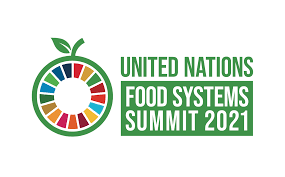World Milk Day 2024 Report – Celebrating Dairy’s Vital Role in Nutrition and Sustainability
This year, on June 1, we celebrated the vital role that dairy plays in delivering…
Every September the world looks towards New York City where the annual High-Level General Debate at the United Nations is held, with optimism and hope that this global body can solve the many challenges humanity faces.
This year, once again, we look to the United Nations in September, with not just hope, but also with ambition; an ambition that is bold, an ambition inspired by the realization that the way we produce and consume food is unsustainable, and unless we act, and act now, we are certain to doom future generations to increased hunger and want. This is an ambition to create immediate change, that is transformative, resulting in a renewed food system that is equitable, sustainable, resilient, respects human rights, and ensures that everyone in the food and agriculture value chain will have a decent job with a dignified living income or wage. We nurture an ambition for a system where producers will receive their fair share and will no longer be among the world’s poorest people, and, where no one, anywhere in the world is left hungry.
ambition; an ambition that is bold, an ambition inspired by the realization that the way we produce and consume food is unsustainable, and unless we act, and act now, we are certain to doom future generations to increased hunger and want. This is an ambition to create immediate change, that is transformative, resulting in a renewed food system that is equitable, sustainable, resilient, respects human rights, and ensures that everyone in the food and agriculture value chain will have a decent job with a dignified living income or wage. We nurture an ambition for a system where producers will receive their fair share and will no longer be among the world’s poorest people, and, where no one, anywhere in the world is left hungry.
How will we achieve this bold and transformative ambition? The United Nations Secretary-General, Antonio Guterres, is scheduled to convene a Food Systems Summit at the level of Heads of State and Government in the context of the high-level week of the United Nations General Assembly in September. The Summit is being held as part of the decade of action to deliver the SDGs by 2030 and will be the first world Food Summit in 25 years and the first to focus on food systems. Dr. Agnes Kalibata of Rwanda serves as the Special Envoy of the Secretary-General for the Summit.
To prepare for the Summit, a wide-ranging and consultative multistakeholder engagement process has been underway over the last year and these have been within the context of the Summit’s Action Tracks, Levers of Change, Scientific and Stakeholder Groups, Public Forums, Public Questionaries, Dialogues and FSS Community page, among others. Over 2000 ideas and game-changers were received by the Secretariat and many of these were advanced in Solutions Clusters under the umbrella of 15 Action Areas identified by the Summit’s Action Tracks.
been underway over the last year and these have been within the context of the Summit’s Action Tracks, Levers of Change, Scientific and Stakeholder Groups, Public Forums, Public Questionaries, Dialogues and FSS Community page, among others. Over 2000 ideas and game-changers were received by the Secretariat and many of these were advanced in Solutions Clusters under the umbrella of 15 Action Areas identified by the Summit’s Action Tracks.
To consolidate all of the substantive work of the Summit into a common vision and initiate commitments to action, a Pre-Summit was hosted by the Government of Italy at the Ministerial level in Rome from July 26-28. The event took the form of a hybrid format and was attended by more than 500 delegates from 108 countries in person, including 62 ministers, and a further 17,000 virtual delegates from 190 countries.
This event has set the stage for an ambitious and productive Summit to be held in September, while also aiming to deliver the latest evidence-based and scientific approaches from around the world. The Pre-Summit announced a set of new commitments through coalitions of action.
Seven Coalitions of Action were announced as follows:
1. Action for Nutrition and Zero Hunger
2. School Meals Coalition
3. Food Loss and Waste
4. Agroecology, Sustainable Livestock and Agricultural Systems
5. Aquatic and Blue Foods
6. Living Incomes and Wages
7. Resilience
At the Summit it is expected that all Stakeholders, in particular Member States, will reaffirm commitment to the achievement of the SDGs, including through investment in transforming food systems – one of the most, if not the most, important systems in the world and one with the power to catalyze action on all SDGs.
The Secretary General’s Statement of Action will also annex a compendium of the inputs received by the Secretariat and this will be extracted from the 2000 plus ideas received, to stand as a reference point going forward. Importantly also, will be the national pathways for food system transformation derived from the over one thousand Dialogues on food systems that have taken place globally. Additionally, the establishment of a follow-up mechanism to bring accountability will be an important next step, and the Deputy Secretary-General of the United Nations indicated this could be a review every two years.
This engagement process by the United Nations in preparation for the Food System Summit has truly been extensive and inclusive, thus far 145 countries are leading national dialogues, and over 50,000 people, from local communities and all constituencies, have been engaged. There have been several rounds of public consultations and questionnaires, through which ideas and game-changers for food systems transformation were encouraged.
The voices have been heard, the ideas have been generated, the challenges identified, and possible solutions continue to be explored. 
What we need now in the weeks leading into the Summit, is to ensure the momentum generated for this Summit is not lost and that we head into September with the sobering knowledge that last year alone, 811 million people faced hunger – 161 million more people than in 2019 and more than 2.3 billion people lacked access to adequate food. All of the progress made in the elimination of hunger and malnutrition is being lost. All Stakeholders – Member States, Private Sector, Academia, Civil Society and others, must come together to create the collective change we need to transform the world’s food systems so that no one is left hungry, so that those in the food systems are not left poor and can live lives of dignity, and so that generations to come can benefit from healthy, sustainable and resilient food systems.